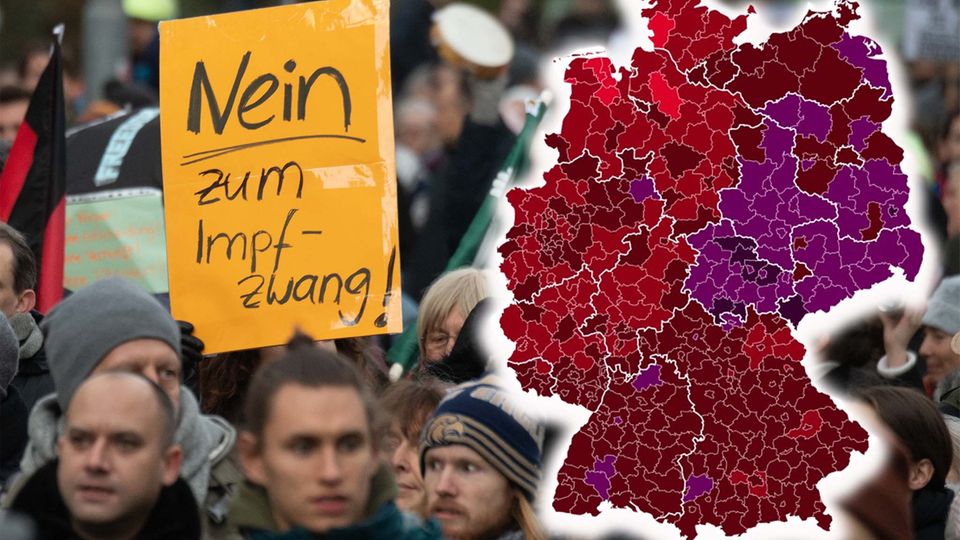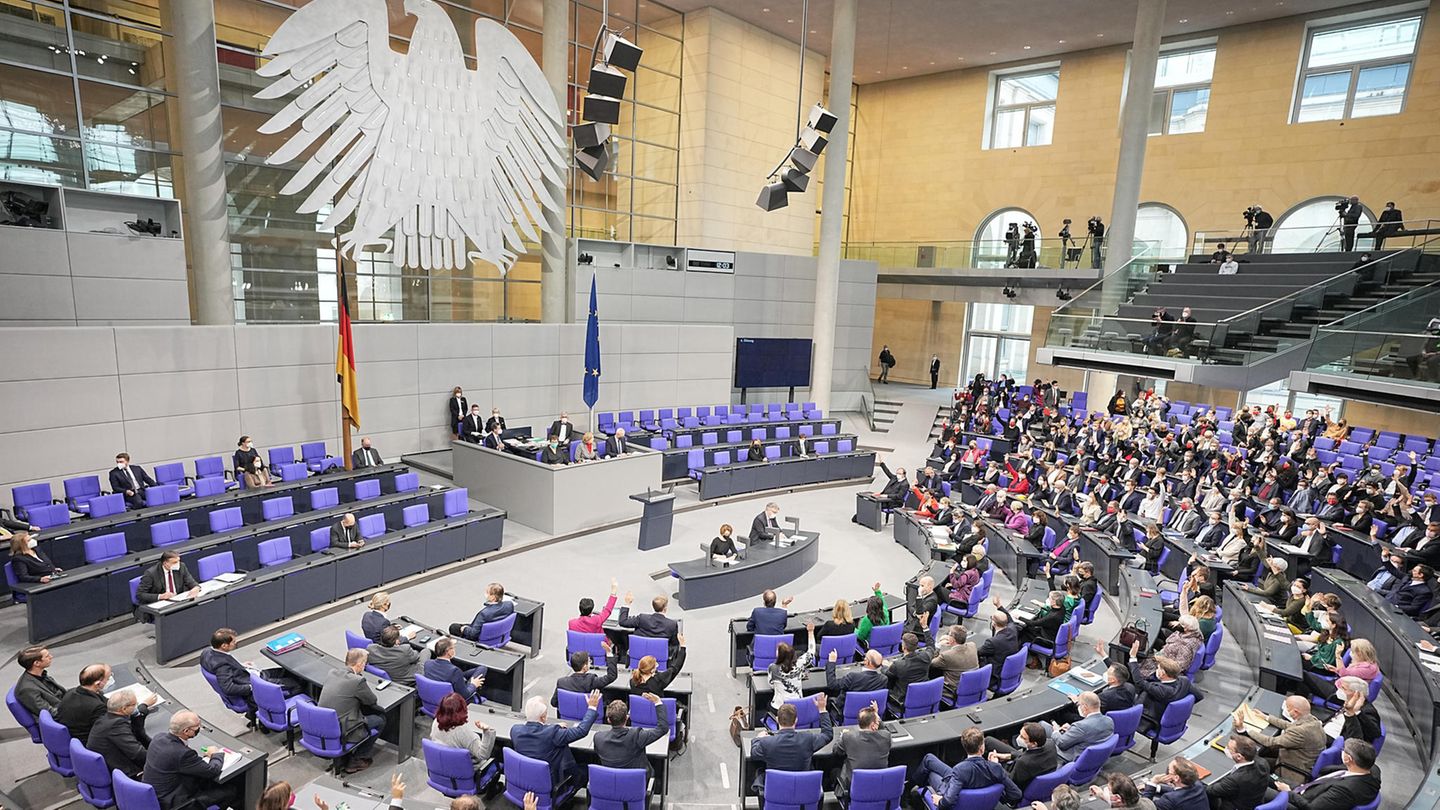It took a long time and went back and forth a lot. But now the amendments to the Infection Protection Act of the new coalition, including a limited vaccination requirement, are to be decided. But whether they are enough is already questionable.
In the fight against the corona pandemic, the Bundestag and Bundesrat are to decide on a first limited vaccination requirement and further crisis regulations this Friday. The legislative plans of the new coalition of the SPD, FDP and Greens stipulate that employees in facilities with vulnerable people such as nursing homes and clinics must provide evidence of vaccinations or convalescence by mid-March 2022. In addition to doctors, pharmacies, dentists and veterinarians should also be able to vaccinate. Options for the federal states to restrict regionally tougher restrictions are to be supplemented and extended. On Thursday evening, Federal Chancellor Olaf Scholz announced joint efforts with the federal states to significantly accelerate vaccinations.
No additional restrictions over Christmas
With regard to the new virus variant Omikron, he said after a switching conference with the heads of government that it was now all the more urgent that as many as possible get a booster. At the same time, the federal and state governments made it clear that there would be no additional restrictions over the Christmas holidays, but that the situation should be monitored. Next week, a panel of experts will also give more precise assessments of Omikron, as the chairman of the conference of prime ministers of North Rhine-Westphalia Hendrik Wüst (CDU) said. If necessary, action should then be taken.
Lack of incentive for booster vaccination?
The German Association of Towns and Municipalities welcomed the commitment to intensify vaccinations, but missed a decision on the scope of a full vaccination. “The question raised by the new Federal Minister of Health as to whether three vaccinations are required for 2G status in the future has not been decided,” criticized General Manager Gerd Landsberg in the Düsseldorf “Rheinische Post”. “That is regrettable, because it could have created a clear incentive for the booster vaccination.” The chairman of the conference of health ministers, the Bayer Klaus Holetschek (CSU), told the TV broadcaster Welt: “At the moment there is a lot to suggest that you will only be fully vaccinated after three vaccinations.” The line ministers would talk about it on Monday or Tuesday. Lauterbach had said on ZDF: “The vaccination is only complete if you have been vaccinated three times.” This is the new reality to be somewhat protected from the Omikron variant.

Ministry of Health is working on procurement of Omicron vaccine
However, in the evening there was a report of Omicron infections despite the third vaccination. According to an investigation, this is said to have been the case with seven Germans in South Africa, as Wolfgang Preiser, member of the research consortium that discovered the variant, told the Berlin “Tagesspiegel” (Friday). But: “Of course you shouldn’t misunderstand that vaccination doesn’t help.” The manufacturers Biontech / Pfizer also assume that their vaccine will continue to protect against serious illness. They want to provide a vaccine adapted to the Omikron variant by March – subject to official approval. The Federal Ministry of Health is currently working on the procurement, as Lauterbach said in the ZDF program “Maybrit Illner”. The run at EU level as well as in bilateral talks. He also assumed that the number of 30 million first, second and booster vaccinations targeted by Christmas will not be enough.
High case numbers increase the pressure on the new government
In its new weekly report, the Robert Koch Institute (RKI) advised greater efforts to combat the pandemic, despite the slight decrease in new infections. The high risk of infection persists in view of the large number of cases, it said in the evening. “The situation can only be improved by intensifying the measures to restrict contact and rapidly increasing vaccination rates.” The new traffic light law plans should make both (again) possible. They should first be decided in the Bundestag and immediately afterwards also in the Land Chamber. An overview:
- Special vaccination requirement: Employees in facilities such as clinics, nursing homes and medical practices should have to submit proof of full vaccination protection or recovery by mid-March 2022 – or a doctor’s certificate that they cannot be vaccinated. From then on, new employees need this right from the start.
- More vaccinations: In addition to doctors, pharmacists, veterinarians and dentists should also be allowed to vaccinate people aged 12 and over for a limited period. Prerequisites should be training and suitable rooms or involvement in mobile vaccination teams.
- Regional measures I: In a very critical situation, the federal states can, after a parliamentary resolution, impose tougher requirements for leisure or sport – but no exit restrictions or general closings of shops and schools according to a first traffic light law. It should now be specified that meetings and events that are not protected demonstrations can be prohibited – especially in sports with a larger audience. It is made clear that restaurants, for example, can be closed – but not fitness centers and swimming pools.
- Regional measures II: Shortly before the end of the “epidemic situation of national importance” on November 25, individual countries had decided on more comprehensive, tougher measures on this old legal basis. These can remain in force until December 15th. According to the latest draft, the deadline is to be extended to March 19.
- Test obligations: Test obligations have already been set for employees and visitors in medical practices, clinics and nursing homes. According to the draft, it should now be specified that patients and “accompanying persons who only enter the facility or the company for an insignificant period of time” are not considered visitors – that is, parents at the pediatrician or helpers for people with disabilities.
- Clinics: Clinics are to receive compensation payments again, for example for beds that have been kept free or stresses caused by patient relocation.
- Short-time work allowance: A topping up of the short-time work allowance, which has already been extended until the end of March, is to be made possible. According to this, 70 percent of the net wage difference should be paid from the fourth reference month – if a child lives in the household, 77 percent. From the seventh reference month onwards, 80 percent and with a child 87 percent are planned. This should apply to employees who were entitled to short-time allowance until March 31, 2021 during the pandemic. In addition, employees who have been on short-time work for the first time since April 2021 should be entitled to the higher benefit rates for the period from January to March 2022.
Source From: Stern
David William is a talented author who has made a name for himself in the world of writing. He is a professional author who writes on a wide range of topics, from general interest to opinion news. David is currently working as a writer at 24 hours worlds where he brings his unique perspective and in-depth research to his articles, making them both informative and engaging.




